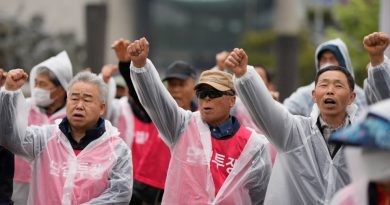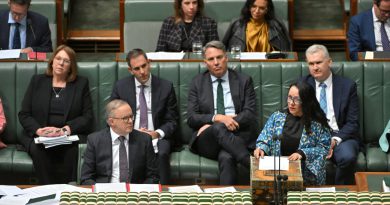Israel strikes dense Gaza camp, says it kills Hamas commander
Gaza (Reuters) – Israeli airstrikes hit a densely populated refugee camp in the Gaza Strip on Tuesday, killing at least 50 Palestinians and a Hamas commander, and medics struggled to treat the casualties, even setting up operating rooms in hospital corridors.
Israeli tanks have been acting in Gaza for at least four days following weeks of air bombardments in retaliation for an attack by Palestinian Hamas militants on mostly Israeli civilians on Oct. 7 and the taking of more than 200 hostages.
An Israel Defense Forces statement said the strike on Jabalia, Gaza’s largest refugee camp, had killed Ibrahim Biari. It said he was a ringleader of what it called the “murderous terror attack” on Oct. 7.
Palestinian health officials said at least 50 Palestinians were killed in the refugee camp blast and 150 wounded. Hamas spokesperson Hazem Qassem denied any senior commander there and called the claim an Israeli pretext for killing civilians.
A Hamas statement said there were 400 dead and injured in Jabalia, which houses families of refugees from wars with Israel dating back to 1948. Reuters could not independently verify the reported casualty figures.
The blast left large craters in a rubble filled area surrounded by wrecked concrete buildings.
Israel has sent repeated warnings to Gaza residents to evacuate northern areas and while many have gone south, many have not.
In Washington, a group of anti-war protesters raised red-stained hands to interrupt a hearing in Congress on providing more aid to Israel. They shouted slogans including, “Ceasefire now!” “Protect the children of Gaza!” and “Stop funding genocide.” Capitol police removed them from the room.
White House national security spokesperson John Kirby had no comment on the blast at the refugee camp, saying he had no information yet. The “killing of civilians is not a war aim” of Israel, Kirby said.
Public Health Crisis Engulfs Gaza
U.N. and other aid officials said civilians in the besieged Palestinian enclave were engulfed by a public health catastrophe, with hospitals struggling to treat casualties as electricity supplies peter out.
After the attack on Jabalia, dozens of bodies lay shrouded in white, lined up against the side of the nearby Indonesian Hospital, footage obtained by Reuters showed.
Juggling dwindling supplies of medicines, power cuts and air or artillery strikes that have shaken hospital buildings, surgeons in Gaza have worked night and day trying to save a constant stream of patients.
“We take it an hour at a time because we don’t know when we will be receiving patients. Several times we’ve had to set up surgical spaces in the corridors and even sometimes in the hospital waiting areas,” said Dr. Mohammed al-Run.
Hamas has told mediators it will release some foreign captives in coming days, Abu Ubaida, the spokesman of the group’s armed wing, al-Qassam Brigades, said in a video on the Telegram app on Tuesday. He gave no further details on the number of captives or their nationalities.
Meanwhile, Israeli families of victims of the Oct. 7 attack appealed to the International Criminal Court on Tuesday to order an investigation into the killings and abductions. Israel is not a member of the Hague-based court and refuses to recognise its jurisdiction.
Wounded Gazans To Be Treated In Egypt
The United States has made “real progress” in the last few hours in negotiations to secure a safe passage for Americans and other foreign nationals who wish to leave Gaza, U.S. State Department spokesperson Matthew Miller said.
The U.S., Qatar and Egypt have been working to open the Rafah crossing into Egypt to allow people to come and go.
Egyptian authorities would allow 81 Gazans who were severely wounded in the weeks of bombardment to enter Egypt on Wednesday to complete treatment, the Palestinian border authority said.
U.N. Secretary-General Antonio Guterres appealed again on Tuesday for the protection of civilians caught in the conflict, stressing the need for proportional behaviour and precautions by all parties.
Israeli Prime Minister Benjamin Netanyahu dismissed international calls for a “humanitarian pause” in fighting to enable emergency aid deliveries to civilians suffering from critical shortages of food, medicine, drinking water and fuel.
He has vowed to press ahead with plans to annihilate Hamas after several inconclusive wars dating back to the militant group’s 2007 takeover of Gaza.
Israeli Ground Forces Battle Hamas In Tunnels
Israeli ground forces battled Hamas gunmen based in a sprawling tunnel network. The tunnels under the cramped enclave are a prime objective for Israel as it expands a ground offensive.
Some of the 240 hostages that Israel says were seized by Hamas are believed to be held in the tunnel complex, posing a further complication for the Israelis on top of the difficulties of fighting in a crowded urban setting.
The Israeli military said its forces had struck about 300 targets over the past day, including anti-tank missile and rocket launch posts below tunnel shafts, as well as underground Hamas military compounds.
Militants responded with anti-tank missiles and machine gun fire, it said. A number of militants were killed, it said, without specifying a number.
Hamas said in a statement its fighters were engaged in fierce battles with Israeli ground forces, who were taking losses. “The occupation is pushing its soldiers into proud Gaza, which will always be the cemetery of invaders,” Hamas said.


